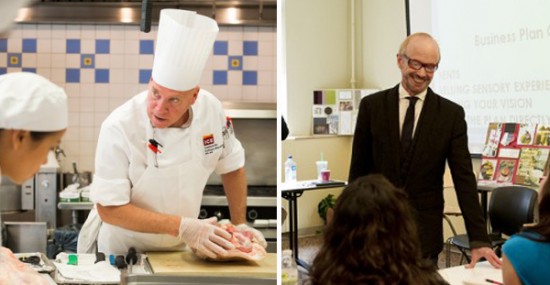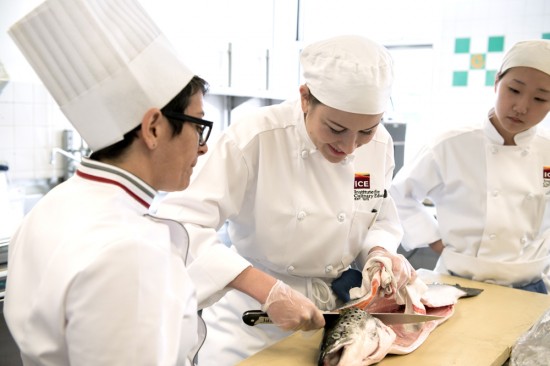
Cook Smarter
Life as a Culinary Student
It’s been two months since I started class at ICE, and from butchering nearly every type of protein, to learning how to properly sauté, grill, roast, poach and steam, to exploring the financial side of culinary business, I can confidently say I’ve learned a lot. But I’m not just learning how to do all these things. I’m learning the why behind everything as well.
No matter what my question is (and I ask quite a few!), the teachers at ICE are incredibly knowledgeable about the topic at hand, and every task we take on in class has a strategic educational purpose. For example, in Module 1 of Culinary Arts, my classmates and I joked that Chef Ted had an encyclopedia for a brain—ask him any question and he knows the answer to it and more.
The same goes for my Culinary Management instructor, Steve Zagor. He has an endless supply of industry stories that provide tangible lessons about running a culinary business—making our classes a series of hilarious and informative parables!

Learning how to cook professionallyandmanage the business side of restaurants at ICE has taught me more about efficiency and waste than I ever thought possible. Take my home cooking habits as an example. Since starting school, I’ve learned I wasn’t cooking nearly as efficiently as I could’ve been in my own kitchen. Sure, I would think through cooking times and what ingredients I needed, but I never made a mise en place list or production schedule before I turned on the stove or oven. As obvious as it may sound to some, doing these simple things has helped me transform into a more strategic, efficient and methodical home cook.
Yet this education goes far beyond reinventing my own home cooking strategy. I’ve discovered that successful restaurant management (see: keeping the rent paid and the lights on) depends on the business skills of the back-of-the-house (BOH) staff. This is because the BOH must help control “food cost,” an essential formula that guides the strategy of any restaurant management team.
In simple terms, food cost is the difference between the amount it costs a restaurant to make a menu item and the price a customer pays for that item. If the kitchen knows how to use every bit of edible food that is bought for production, the management team gets more bang for their buck and, in turn, more money is generated to invest in the restaurant’s future.
In short, this means that cooks can’t just show up to work and use the prime cuts, the pretty carrots, etc. A good cook—and certainly a chef—is a smart, efficient worker who has mastered strategies for reducing food waste. As a practical example: the other day, I had the chance to fabricate a whole salmon.
The goal was to get eight fillets from the whole fish, but even after fabricating the fish, there was still some salmon meat left—called “edible trimmings.” For any food business, the smart thing to do is to take those edible bits and make, say, salmon tartare, turning that potential waste into an elegant appetizer (and a moneymaker!).
At this point, you may be wondering just how I’ve learned this much in just two months. While ICE offers flexible schedules for students who are still working full-time, I’ve been pursuing a full class schedule at ICE—meeting every weekday afternoon for Culinary Arts and three mornings a week for Culinary Management. What’s great is that the course times allow me to complete both programs at once, which means I can finish my diplomas and start my new career in food as soon as I possibly can.
It’s a lot of hard work and takes a lot of commitment, but I wouldn’t change a single thing about taking this leap into culinary school. Just like ICE is teaching me how to work efficiently in the kitchen, they’ve taken the same approach to their curriculum. For a career changer, the fact that I can gain both kitchen and business skills in only seven months is key, and I know I’ll be able to hit the ground running after graduation.
Click here to learn more about ICE's "double diploma" in Culinary Arts and Culinary Management.



Add new comment